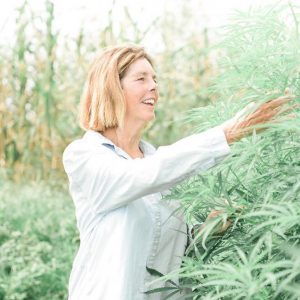Are you writing a story on hemp, CBD, regenerative farming, circular economies, or women in business? Consider the unique perspective of Laura Freeman, owner of Mt. Folly Farm and founder of Laura’s Lean Beef, Laura’s Mercantile, Laura’s Homestead Alternatives, Regeneration Distillery, and Mt. Folly Enterprises an opportunity zone company.
Laura Freeman is available for interviews, speaking engagements, podcasts, quotes, and more.
Members of the press should contact us here.
At Laura’s Mercantile, we are committed to assisting you. Whether you have questions about CBD or hemp, concerns about our products or orders, or any general inquiries, feel free to contact us at support@laurasmercantile.com.
About Laura Freeman
Laura Freeman, founder of Laura’s Lean Beef and Mt. Folly Enterprises, is a prominent figure in the regenerative agriculture movement, deeply rooted in the local food and local economy initiative.
“Starting in 1985, I was one of the first to raise and market beef raised without antibiotics or growth hormones,” Freeman explains.
However, Laura’s environmental goals extend far beyond sustainable farming within industrial food systems. She soon recognized the need for a more comprehensive approach.
“Yet I realized that farming better, and then plugging sustainable farming into the industrial food system, with its vast distribution channels, excessive food miles, and global production model, doesn’t achieve the environmental goals I seek.”
By the mid-2000s, Freeman had embraced a systems-based approach to addressing the climate crisis, turning to regenerative agricultural methods to help sequester carbon.
“Agricultural land is the last great carbon sink. Rather than keeping carbon in the ground, where it belongs and where it benefits plant growth, industrial agriculture has depleted the soil’s carbon stocks,” she explains. “Not only can we reverse this, but we can add and sequester carbon fairly rapidly, with different management strategies.”
Still, Freeman acknowledges that integrating improved farming practices into the global food system falls short of significantly reducing carbon footprints. For real environmental progress, a more localized and regenerative approach is essential.
“At Laura’s Lean Beef Company, we were running refrigerated trucks all over the United States and into Canada,” she says. “This won’t work if your goal is to mitigate climate change.”
And now the company which in 2008 purchased Laura’s Lean Beef has introduced a meatless “hamburger” patty, made primarily from organic soybeans.
“I don’t have the facts on this right now, but around 80% of the organic soybeans used in the United States are imported, and in general manufactured food has a problematic carbon footprint.”
 Freeman is assembling the facts on cattle raised and marketed locally. She and her colleagues think that well-managed pasture-raised cattle contribute more to building soil organic matter, and thus sequester more carbon, than their enteric system produces.
Freeman is assembling the facts on cattle raised and marketed locally. She and her colleagues think that well-managed pasture-raised cattle contribute more to building soil organic matter, and thus sequester more carbon, than their enteric system produces.
Freeman has learned much from the past. For this reason, she recently has opened a farm-to-table restaurant, bakery and distillery in near-by Winchester, Kentucky, and is in the process of restoring a second downtown building for staff offices and apartments.
“The whole idea here is to localize the economy, which in part means revitalizing our downtown and strengthening our community,” she says.
The new venture brings people downtown to work and live. Freeman is passionate about the garden space she carved out of an old parking lot behind the distillery, too.
“I never thought I’d garden with a jackhammer, but that is what it took to get a little green space in this neglected part of town,” she says.
She hopes members of the community will gather there, “just to hang out and get to know each other.”
An accomplished equestrian, in 2005 Freeman took a horseback fall that changed her life. It took her years to recover, and she considers this her greatest personal accomplishment. CBD hemp was central to her comeback. Happily married and now a grandmother, she is concerned about the future and is proud that her daughter, granddaughter and grandson are climate activists.
Freeman was a founding member of the Community Farm Alliance, and traveled to Europe, countries of the former Soviet Union, and Central and South American through agricultural programs funded by the Kellogg Foundation. In 2008 she was elected to the Bluegrass Business Hall of Fame.
She has served on the administrative council (the governing body) of the Southern Sustainable Agriculture Research and Education program, is a fellow of the Donella Meadows Institute, and a member of the Policy Committee of the Organic Farmer’s Association.
To request an interview with Laura, members of the press should contact us here.
Laura In The News
The Lane Report: Local Jobs, Local Wealth and a Fix for Climate Change
Six Questions With CEDIK: Eating Local With Laura Freeman
Rodale Institute: Organic Farms Adapting For COVID-19
Keeneland Magazine: “Ahead Of Her Time”
NBC Nightly News: “What You Need To Know About CBD Oil, The Health
Craze Getting National Buzz”
TODAY Show: “Walgreens To Start Selling CBD Products: What To Know”
The Washington Post: “Is the hype about CBD, or cannabidiol, real?”
Smiley Pete: Agrarian Entrepreneur Laura Freeman launches new businesses from her Clark County farm
WKYT: “Kentucky hemp farmers react to likelihood of new Farm Bill”
WKYT: “Hemp is giving a Kentucky farmer a new lease on life”
LEX 18: Mt. Folly Farm Mission
Go Solo: Rooted in Sustainability
